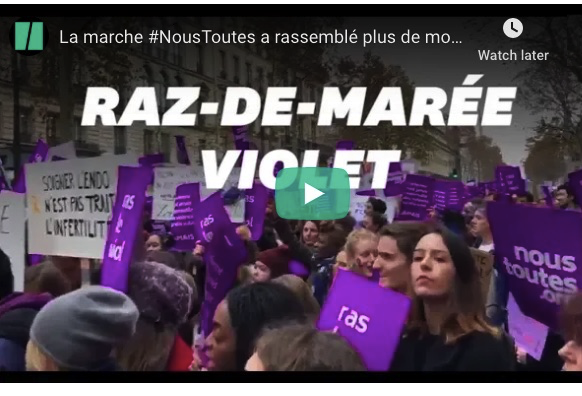. . WOMEN’S EQUALITY . .
An article from the Huffington Post (translated by CPNN)
SEXISM – “Down with Rape!”: Tens of thousands of women and men, according to the organizers, took to the streets in France this Saturday, November 24 at the call of a collective that had called for a “feminist tidal wave” against sexist and sexual violence a year after the start of the #MeToo movement.

Video of the demonstration
In contrast to the “yellow vests“, demonstrations in France [editor’s note: demonstrations against the rise in gasoline prices that turned to violence], the women’s demonstrations are adorned with purple, the color chosen by the movement #NousToutes for the actions organized on the eve of the International Day for the Elimination of Violence to women.
Similar events took place in other European cities, including Rome, Athens and Geneva.
“This is the biggest feminist mobilization that we have known in France,” said its organizer, Caroline De Haas, who announced that 50,000 people took to the streets, including 30,000 in Paris. Last year, there were 2000 in the Paris demonstration, according to police source.
On Saturday, police and prefectures estimated 12,000 demonstrators in Paris between Opera and Republic, 2400 in Lyon, 1500 in Marseille, 950 in Rennes, 850 in two processions in Nantes, 600 in Toulouse …
Many demonstrators carried placards “Down with rape!”, demanding the end of “the impunity of the aggressors” and “sufficient financial means” for the fight against this violence.
Muriel Robin, Eva Darlan and Vanessa Demouy were present
Personalities from diverse backgrounds, including actresses Muriel Robin, Eva Darlan and Vanessa Demouy, joined the Parisian march.
“I’m here to support all the victims and continue this fight that began well before me,” said Muriel Robin, wearing a purple scarf on her arm. She had gathered more than a thousand women in Paris in October against domestic violence.
(article continued in right column)
Protecting women and girls against violence, Is progress being made?
How effective are mass protest marches?
(article continued from left column)
From Rennes to Lyon and Toulouse, the processions were composed mostly of women of all generations, but also of men. For Tanguy, a 19-year-old Rennes student, “it’s a movement that has no sex”, “a fight of both men and women, together, against inequalities”.
Rirette, 84, came to protest in Lyon for “equality of pay, rights and sexual behavior.” “Non-consent is a horrible thing and it is judged (by the courts) too lax,” denounced this former administrator.
“The street is ours”
“Sexism kills”, “You are not alone”, “The street is ours”, “No means no”, could be read on the signs in Lille, along with flags of political movements (Generations , EELV) and trade unions (CGT and Sud).
In Toulouse, the entire event sang with one voice several slogans carefully prepared: “Proud, ‘venerable’, not ready to be silent!”, “Freedom, equality, sorority”, “Your hand on my ass, my fist in your mouth “,” Tax cons, not tampons”…
Born in September and supported by a number of associations, the #NousToutes movement was “moving from testimony to action” one year after #MeToo, which boosted the number of sexual violence cases reported to the police by 23%.
In France, in 2016, 123 women were killed by their spouse or ex-companion, about one every three days. Each year, nearly 220,000 women experience violence from their spouses or ex-companions, according to official 2017 figures. In addition, more than 250 women are raped each day, and one in three has been harassed or sexually assaulted at work.
Equality between women and men “great cause of the five-year electoral period” Macron
A year ago, President Emmanuel Macron decreed equality between women and men “great cause of the next five year electoral period”, during a speech at the Elysee.
But “if there is no money, public policies will not follow,” said Caroline De Haas. Funds earmarked to help women who are victims of domestic violence are expected to rise to at least € 506 million a year from 79 today, five organizations including the Economic, Social and Environmental Council (EESC) said this week.
Hundreds of personalities and trade unionists – women and men – joined Saturday’s movement.
In Paris, men were excluded from a “small non-mixed space” to reassure” women victims of various forms of violence who did not feel comfortable to march with men around them. This initiative was criticized on social networks, including by feminist activists, and it attracted only five people, according to the person in charge of this space.